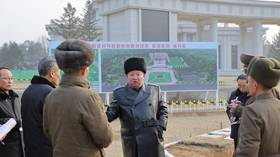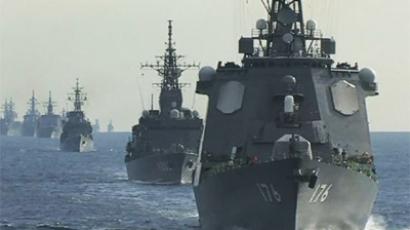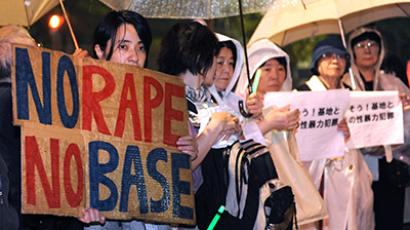US military suffers Japan base setback
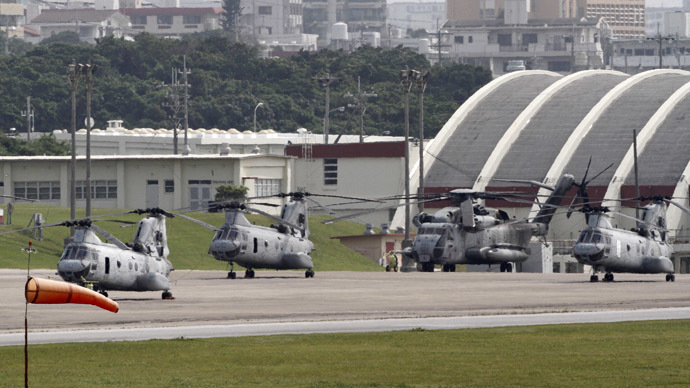
Opponents of a new US army base in Japan won a key victory on Sunday. Candidates against the idea now have a majority in Nago's city assembly, as they look to block the construction of the new facility in the Okinawa Prefecture.
The assembly in the city of Nago now contains 16 members out of a total of 27 who are against the relocation of a US base from Futenma. They are both located in the Okinawa Prefecture - Japan’s southernmost district, made up of some of the Ryukyu Islands. The facility is situated in a densely-populated urban area in southern Okinawa. However, the government wants to move it to Nago, a smaller city to the north that already hosts Camp Schwab, another US Marine base.
The results will please the Nago Mayor Susumu Inamine, who is resolutely against the construction of the new military base. There has been significant local opposition to the relocation of the facility and the re-election of Inamine in January by a wide margin was effectively a de facto referendum on the US facility.
“Why should only Okinawa hold the burden for security of all of Japan, when the presence of US Marines doesn’t play a big role in deterring China?”Inamine, said in May, whilst on a visit to Washington, DC. “I, as mayor, have operational control over two ports that are needed for use as construction landfill and I will exercise all powers in the municipality to block access.”
Voter turnout at the assembly vote on Sunday was 70 percent, showing there is strong local interest surrounding the base. The results will come as a blow to Japanese Prime Minister Shinzo Abe, who is in favor of the relocation move, as he sees the US presence as a needed deterrent against China.
On April 24, Abe and US President Barack Obama“affirmed the resolve on both sides” to make “steady progress” on transferring the Marine base in Futenma.
The estimated cost of the relocation is about $8.6 billion, and Japan will cover $3.1 billion of that sum.
In December 2013, the governor of Okinawa, Hirokazu Nakaima agreed to the base’s relocation in return for large-scale funds from Tokyo, which he hoped would be used to revitalize the local economy. In August, Japan’s Ministry of Defense started a drilling survey off the coast of Nago to prepare for the building of the base, which was to be built on a landfill site.
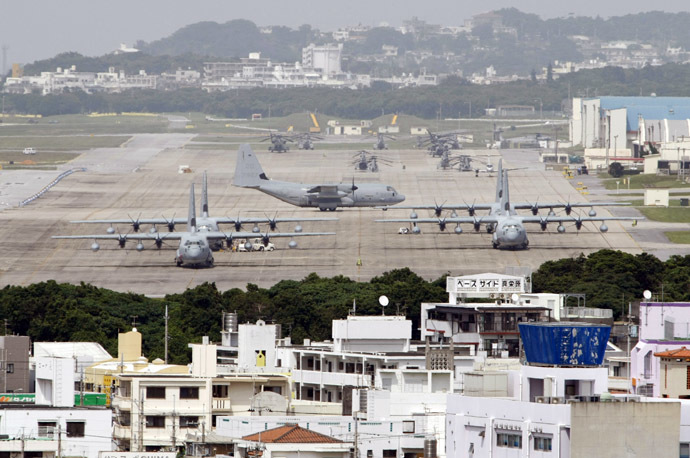
Tokyo and Washington are negotiating multiple plans regarding the relocation, according to the Japan Daily Press. One is to allow Japanese authorities to enter US bases for environmental checks and other official purposes, which Tokyo believes will complement the existing Status of Forces Agreement. Another is to advance the return of land where Futenma is currently, which is now scheduled for 2022.
In addition, Japan is suggesting that US exercises involving the controversial MV-22 Osprey transport aircraft occur in several locations - not just in Okinawa.
The United States agreed in 2006 to move the base to the coast, but local opposition prevented the potential shift. Anti-base sentiment and concern about US military operations at Futenma has long been an emotionally charged issue in Okinawa.
Japan hosts some 50,000 American soldiers and officers, particularly in Okinawa. Their presence is a constant source of tension with local populations due to crimes committed by the servicemen, disruptions caused by military flights and land use by the US forces.
For instance, last October, a local woman was raped by US military personnel. The incident provoked anger among locals and forced the American military to enforce a curfew upon its service members. The incident led to protests by outraged locals, while due to the seriousness of the case, it was held in a Japanese court. 24-year-old Seaman Christopher Browning was sentenced to 10 years behind bars, while 23-year-old Petty Officer 3rdClass Skyler Dozierwalker received nine years’ imprisonment.
The Okinawa prefecture, which is the southernmost Japanese district, is strategically vital to the US military given its proximity to the rest of Asia. The islands accounts for less than 1 percent of Japan’s total territory, but hosts about half the 38,000 US military personnel stationed in Japan.







